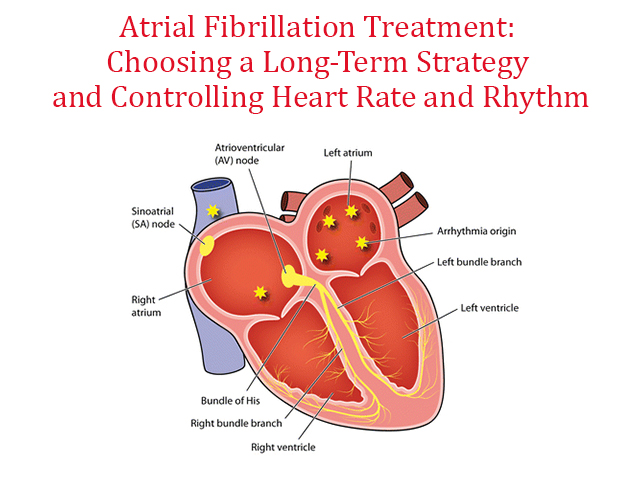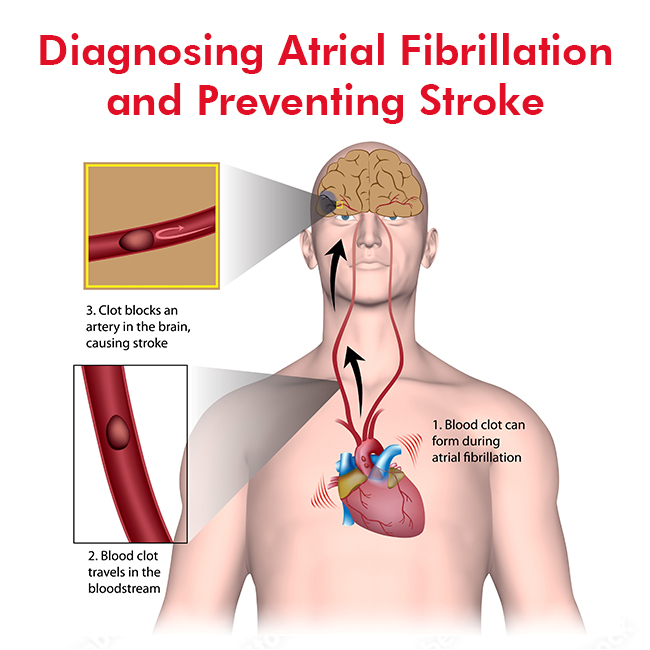Atrial fibrillation is a progressive heart disease that can’t be cured. But the right course of treatment can help control afib symptoms and help patients live a close-to-normal life.
If you want to learn more about diagnosing atrial fibrillation, check out our previous blog posts.
Advancements in medical research have led to the development of different treatments for atrial fibrillation. Typically, you can choose from two treatment options – heart rate control and heart rhythm control.
Let’s take a look at the available treatment options and help you choose the right one.
Afib Treatment: Controlling Heart Rate
Rate control is an effective afib treatment option that involves controlling abnormal electrical activity in the atria to slow down the heart. This can be achieved with the help of medications or a surgical procedure.
Medications for Rate Control
Rate control medications slow down the conduction of electrical signals in the heart to prevent it from beating faster. These include:
- Beta-blockers like atenolol (Tenormin), bisoprolol (Concor), carvedilol (Cardivas), metoprolol (Lopressor, Toprol), etc.
- Calcium-channel blockers like diltiazem (Dilzem) and verapamil (Calaptin)
- Digoxin (Lanoxin)
Beta-blockers and calcium-channel blockers (CCBs) are more widely used. However, they can cause side effects, such as headaches and dizziness.
Digoxin is prescribed to patients who can’t take beta-blockers or CCBs. Potential side effects include anxiety, mood swings, dizziness, nausea, and vomiting.
Irrespective of the type of medication you take, it can take time to identify the correct dosage. Also, your doctor might ask you to wear a Holter monitor to understand whether the medication is working.
AV Ablation
If rate control medications don’t work for a patient, they can undergo a procedure called AV ablation. It involves destroying cells in the atrioventricular node in the right atrium and installing a pacemaker to stabilize the heart rate.
Afib Treatment: Controlling Heart Rhythm
If afib symptoms, such as dizziness and fatigue, disrupt your normal life, your doctor might recommend treatment options to control the heart rhythm. However, it’s worth noting that it involves more serious side effects and risks.
The most commonly used rhythm control treatments for afib include:
Antiarrhythmics
Antiarrhythmics are medications that help the heart maintain its normal rhythm. These include:
- Amiodarone (Cordarone)
- Disopyramide (Norpace)
- Dronedarone (Multaq)
- Flecainide (Tambocor)
- Propafenone (Rythmonorm)
- Sotalol (Sotagard)
Cardioversion
Cardioversion is a medical procedure that restores the heart’s normal sinus rhythm using electrical impulses or antiarrhythmic medications. Electrical cardioversion initially works for 90% of patients. Doctors often recommend rhythm control medications after the procedure to keep the heart’s rhythm in check.
It’s worth noting that cardioversion increases your risk of stroke. So, you might have to take anticoagulants for a month before and after the procedure.
Catheter Ablation
Catheter ablation is a minimally invasive procedure that controls an abnormal heart rhythm by destroying tiny spots of tissues in the atrium. It involves the use of heat (radiofrequency ablation) or cold(cryoablation).
Risks and complications of catheter ablation include stroke, heart attack, damage to blood vessels, and fluid buildup around the heart.
Choosing the Right Treatment
Your choice of afib treatment depends on various factors, including your age and how long you’ve had afib. For instance, if you’re young and have been newly diagnosed, cardioversion or catheter ablation might deliver better results. Rhythm control treatment is also essential for patients who experience severe symptoms.
On the other hand, if you’re older and don’t experience significant symptoms, such as dizziness, palpitation, and fatigue, rate control treatment might be better suited for you.
In Conclusion
Treating atrial fibrillation involves controlling the heart’s rate and rhythm to minimize bothersome symptoms. If you’ve been experiencing frequent afib episodes, consult your doctor right away to explore your treatment options.
Dr. C Raghu is a renowned cardiologist with more than two decades of experience. If you’ve been diagnosed with atrial fibrillation, reach out to Dr. Raghu today to choose the right treatment plan for your condition.
Book Online Consultaion
Atrial Fibrillation Treatment: Choosing a Long-Term Strategy and Controlling Heart Rate and Rhythm Blog





